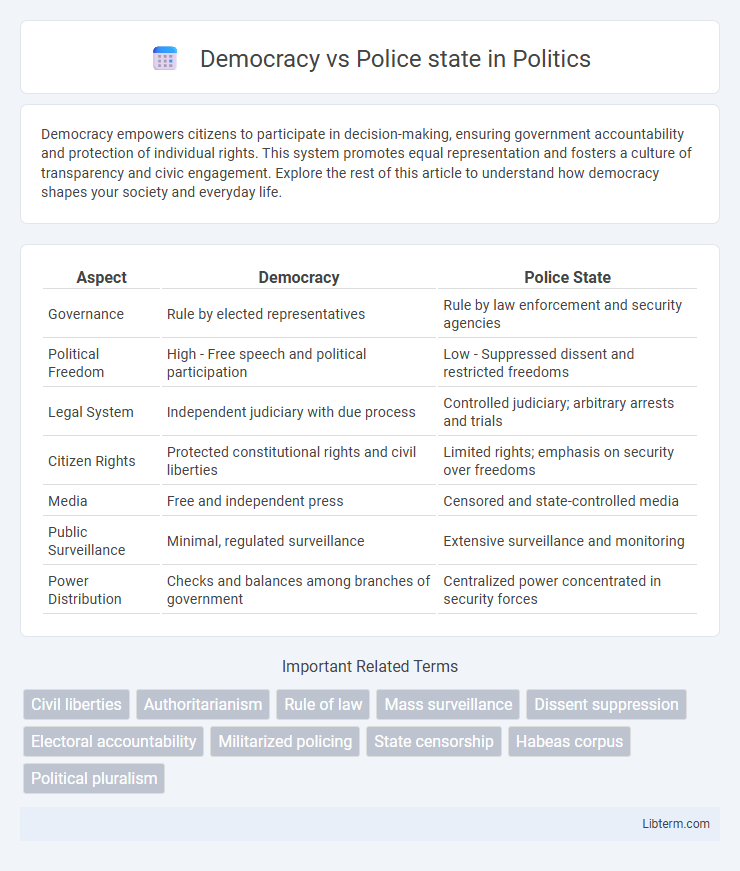Democracy empowers citizens to participate in decision-making, ensuring government accountability and protection of individual rights. This system promotes equal representation and fosters a culture of transparency and civic engagement. Explore the rest of this article to understand how democracy shapes your society and everyday life.
Table of Comparison
| Aspect | Democracy | Police State |
|---|---|---|
| Governance | Rule by elected representatives | Rule by law enforcement and security agencies |
| Political Freedom | High - Free speech and political participation | Low - Suppressed dissent and restricted freedoms |
| Legal System | Independent judiciary with due process | Controlled judiciary; arbitrary arrests and trials |
| Citizen Rights | Protected constitutional rights and civil liberties | Limited rights; emphasis on security over freedoms |
| Media | Free and independent press | Censored and state-controlled media |
| Public Surveillance | Minimal, regulated surveillance | Extensive surveillance and monitoring |
| Power Distribution | Checks and balances among branches of government | Centralized power concentrated in security forces |
Understanding Democracy: Core Principles
Democracy is grounded in core principles such as individual freedom, rule of law, and political pluralism, ensuring that citizens have the right to participate in decision-making through free and fair elections. Transparency, accountability, and protection of human rights are fundamental to maintaining a democratic society. In contrast to a police state, where power is centralized and dissent is suppressed, democracy promotes open dialogue and equal representation.
Defining a Police State: Key Characteristics
A police state is defined by the pervasive presence of government surveillance, restricted civil liberties, and centralized control enforced through a powerful, often militarized police force. Key characteristics include the suppression of political dissent, lack of transparent judiciary, and extensive use of secret police to monitor and intimidate citizens. Unlike democracies, where governance is based on rule of law and individual freedoms, police states prioritize state security over personal rights.
Civil Liberties in Democracies vs Police States
Civil liberties such as freedom of speech, privacy, and assembly are fundamental in democracies, where legal frameworks and independent institutions protect individual rights against government overreach. In police states, these civil liberties are severely restricted or eliminated, with pervasive surveillance, censorship, and arbitrary arrests enforcing strict control over the populace. The presence or absence of these rights fundamentally distinguishes democracies from police states, impacting citizens' ability to participate freely in political and social life.
Role of Law Enforcement: Protectors or Enforcers?
In a democracy, law enforcement serves primarily as protectors of citizens' rights and upholders of justice within a framework of accountability and transparency. Conversely, in a police state, law enforcement functions as enforcers of government control, often prioritizing regime stability over individual freedoms and employing surveillance, intimidation, and repression. The fundamental distinction lies in whether police empower civil society or suppress dissent to maintain authoritarian rule.
Freedom of Speech: Open Debate or State Censorship?
Democracy champions freedom of speech as a fundamental right, enabling open debate and diverse viewpoints that foster societal progress and accountability. Police states impose strict state censorship, suppressing dissenting opinions to maintain control and limit public discourse. The contrast between these systems highlights the vital role of unrestricted expression in protecting individual liberties and sustaining transparent governance.
Elections and Political Representation
Elections in a democracy are free, fair, and competitive, ensuring genuine political representation where citizens vote to choose their leaders and influence policy decisions. In contrast, a police state often conducts elections that are controlled, manipulated, or merely symbolic, limiting political participation and consolidating power among authoritarian rulers. The lack of authentic electoral processes in a police state suppresses dissent and undermines the legitimacy of political representation.
Surveillance: Privacy vs Security
Surveillance practices in a democracy strive to balance individual privacy rights with national security needs, often regulated by transparent laws and judicial oversight to prevent abuse. In contrast, a police state enforces pervasive surveillance with minimal accountability, prioritizing state control and security over personal freedoms, leading to widespread privacy violations. The fundamental tension between privacy and security highlights the importance of legal frameworks and public trust in maintaining democratic societies.
Public Participation and Dissent
Democracy thrives on robust public participation, allowing citizens to actively engage in policymaking, voice dissent, and hold authorities accountable through free elections and open debate. In contrast, a police state suppresses public involvement by enforcing strict control over expression and assembly, often criminalizing dissent to maintain power. The health of a democracy is measured by the extent of civic engagement and protected civil liberties, whereas police states rely on fear and coercion to stifle opposition and silence citizens.
Human Rights Implications
Democracy upholds fundamental human rights such as freedom of speech, assembly, and fair trial, ensuring government accountability through transparent institutions and participatory governance. In contrast, police states often suppress these rights via pervasive surveillance, arbitrary detentions, and limited civil liberties, prioritizing state control over individual freedoms. The human rights implications of policing policies in authoritarian regimes include increased risk of abuse, denial of justice, and erosion of personal autonomy.
Societal Impact: Trust, Stability, and Growth
Democracy fosters societal trust through transparency, citizen participation, and accountability, which drives social stability and economic growth. In contrast, a police state often erodes public trust via surveillance and repression, leading to social unrest and inhibited development. The stability of democratic societies is bolstered by inclusive governance, while police states rely on control that stifles innovation and long-term prosperity.
Democracy Infographic

 libterm.com
libterm.com